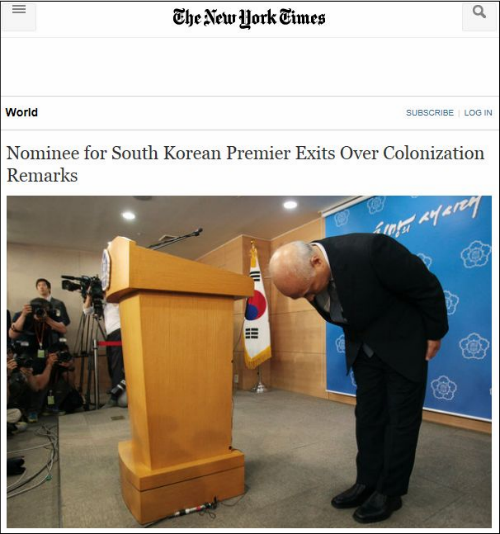문창극 자진사퇴 거론.. “또 하나의 정치적 타격 입게 돼”
<뉴욕타임즈>가 문창극 전 국무총리 후보자 사퇴와 관련해 “박 대통령이 여론을 통과할 후보자를 고를 능력이 있는지 의구심을 품게 한다”고 지적했다.
외신전문사이트 <뉴스프로>에 따르면, 24일 <뉴욕타임즈>는 세월호 참사 이후 지지율이 떨어진 박 대통령이 지난 화요일 두 번째 국무총리 지명자 자진사퇴로 또 하나의 정치적 타격을 입게 됐다고 보도했다.

<뉴욕타임즈>는 ‘일본의 식민지 지배는 하나님의 뜻’, ‘게으르고 자립심이 부족하고 남한테 신세지는 게 우리민족의 DNA’, ‘분단과 한국전쟁도 하나님의 뜻’ 등 문제가 된 문 전 후보자의 발언을 상세히 소개했다.
이어 “비평가들은 이런 발언들을 총리 후보자가 자신의 조국의 식민화를 정당화하는 것이라고 해석했다”며 “그들은 아베 신조 총리를 비롯한 일본의 극우주의 정치인들이 식민지배가 많은 한국인들이 떠벌리고 있는 것처럼 그렇게 나쁘지는 않았다는 주장을 확고히 하는 데 문 씨의 발언들을 이용하려 할 것이라 주장했다”고 덧붙였다.
또 <뉴욕타임즈>는 “이 소동으로 문 씨는 한국에서 치명적인 정치적 별칭인 ‘친일파’로 낙인 찍혔다”고 전하며 “일제의 한국 감정기를 둘러싼 역사적 이슈들은 박 대통령 자신에게도 문제가 되고 있다”고 지적했다.
<뉴욕타임즈>는 “박 대통령의 아버지, 전 독재자 박정희는 한때 일본제국군의 장교였다”며 “2012년 대선 유세기간 동안, 박근혜후보를 거침없이 비판한 사람들은 그러한 가족사를 언급하며 그녀를 신뢰해서는 안 된다고 주장했다”고 전했다.
|
Nominee for South Korean Premier Exits Over Colonization Remarks SEOUL, South Korea — President Park Geun-hye, whose approval ratings have fallen since an April ferry disaster that left hundreds dead, suffered a new political blow Tuesday as her second consecutive nominee for prime minister stepped aside, amid a furor over his suggestion that Korea’s colonization by Japan had been “God’s will.” “Since I was appointed as prime minister, this country has plunged even deeper into severe confrontation and divide,” Moon Chang-keuk said at a news conference. “I have decided that I should help President Park by stepping down of my own will.” Mr. Moon, once a well-known conservative newspaper columnist, was Ms. Park’s second nominee for prime minister to withdraw before his confirmation hearings in the National Assembly could even begin. The first, Ahn Dae-hee, a former Supreme Court justice, stepped aside last month because of a controversy over his post-retirement earnings. Each had been nominated to replace Prime Minister Chung Hong-won, who resigned over the government’s handling of the April 16 ferry sinking, in which more than 300 people were killed, most of them students. The post of prime minister is a largely ceremonial one in South Korea. But the botched appointments cast doubt on Ms. Park’s ability to choose a candidate who could pass the test of public opinion in a country deeply divided over her administration. Mr. Moon’s trouble began when a national television network, KBS, broadcast footage from a 2011 lecture he had given at his Presbyterian church in Seoul. “We may protest, ‘Why did God make this nation a colony of Japan?’ But as I said earlier, there is God’s will in it,” Mr. Moon, an elder at his church, said from the pulpit, according to the video, which circulated widely online. Mr. Moon also said that the Korean elite had been hopelessly corrupt and inefficient before colonization began in 1910. “Laziness, lack of independence and a tendency to depend on others were in our national DNA,” he said in the speech. God’s message, he said, was “you needed hardship,” in the form of colonization. Mr. Moon also said that “in retrospect, it was also God’s will” for Korea to be divided into a Communist North and a pro-American South after Japan’s rule ended with its defeat in World War II. Noting that there were many Communists among Korea’s elite at the time, Mr. Moon said, “Given the way we were then, had Korea been liberated as a whole, it would have been Communized.” Critics interpreted the remarks as a prime-minister-to-be’s justifying his own country’s colonization. They argued that nationalist politicians in Japan, including Prime Minister Shinzo Abe, would use his remarks to strengthen the case that colonial rule was not as bad as many Koreans have made it out to be. Relations between Japan and South Korea have chilled in recent years, with historical and territorial issues at the root of many disputes. Mr. Moon expressed regret over what he called a “misunderstanding” arising from “a little gap between what can be said inside a church and sentiments of ordinary people.” But he said that political opponents had distorted comments he had made to a private audience. The uproar led to Mr. Moon’s being labeled “pro-Japanese,” a toxic political epithet in South Korea. Even some prominent members of Ms. Park’s party joined the opposition in demanding that Mr. Moon step down. Historical issues involving Japan’s rule over Korea have been problematic for Ms. Park herself. Her father, the former dictator Park Chung-hee, was once an officer in Japan’s Imperial Army; during Ms. Park’s presidential campaign in 2012, her most outspoken critics cited that family history to argue that she could not be trusted. |


